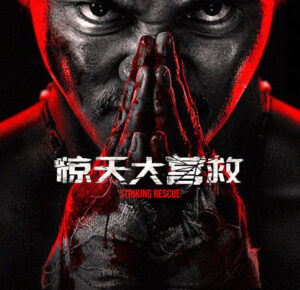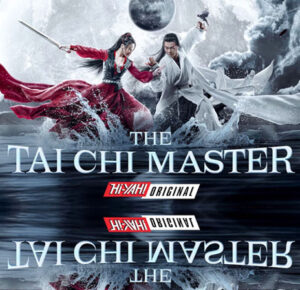
“Ace Attorney” Japanese Theatrical Poster
Director: Takashi Miike
Cast: Hiroki Narimiya, Takumi Saito, Mirei Kiritani, Akiyoshi Nakao, Shunsuke Daito, Akira Emoto, Rei Dan, Mitsuki Tanimura, Takehiro Hira, Eisuke Sasai
Running Time: 135 min.
By Paul Bramhall
Anyone with even a passing interest in Asian cinema will most likely be familiar with the name of director Takashi Miike. From the early-90’s, all the way up to the mid-2000’s, Miike was responsible for some of the most insanely creative, often grotesque, completely out there cinema to come out of Japan. Working almost exclusively within the DTV (direct-to-video) industry, titles like Audition, Visitor Q, and Ichi the Killer, combined with his ability to crank out several titles in one year, saw him quickly develop a devoted following in the west.
Then in 2007 the seemingly unthinkable happened, it was announced that Miike was going to be directing a big screen adaptation of the popular manga, Crows Zero – a tale of high school gangs fighting for supremacy – in what was a decidedly unexpected venture into mainstream filmmaking. Thankfully, it turned out that he was just as adept at working within the Japanese studio system as he was within the DTV arena, and the movie was a resounding success both with critics and fans, so much so that he’d return to direct the sequel 2 years later.
Miike has remained in the mainstream since then – be it turning his hand to anime adaptations such as Yatterman, remaking samurai movies from the golden age like 13 Assassins, taking a crack at children’s movies with Ninja Kids, or even straight laced blockbuster thrillers like Shield of Straw. One of my personal favorite Miike movies is his 2007 adaptation of the Sega video game of the same name – Yakuza: Like a Dragon. While it seems like an almost impossible task to make a successful movie from a video game, somehow Miike managed to do it, so when I heard he was going to be adapting another, the popular Capcom franchise Ace Attorney, I was curious to check it out.
For the purposes of full disclosure, I’m not a gamer, and never have been. I’ll be reviewing Ace Attorney purely as a movie, with no connection to how closely it depicts the gaming world, so if you’re a fan of the game, you may want to stop reading here. That being said, I’ve never played Yakuza: Like a Dragon either. The fact is if you’re a good director, even someone who has no familiarity with the source material shouldn’t have any trouble enjoying what’s onscreen.
One aspect of the adaptation I am aware of though, is that it’s based on the second and fourth cases from the video game series. This in itself is an interesting move, as with it being a courtroom drama, the whole element of mystery and not knowing who did it is perhaps the single biggest factor in enjoying a movies initial viewing. While fans of the game will no doubt be delighted to hear it’s a direct adaptation of the source material, rather than a re-imagining of it, it does mean that they’ll also know exactly how it’s going to end. For a 135 minute movie that hinges on guessing who did the deed, you’d think this might be a small oversight on behalf of everyone involved.
Sadly though, after sitting through the full 135 minutes, I can safely say that it’s not just the enjoyment of the fans which is in danger, but also the wider audience as well. Putting aside both the fact that it’s a Miike Takashi movie and that it’s a video game adaptation, judged purely on its merits as popcorn entertainment, Ace Attorney is painfully dull. There are plenty of quirky touches from Miike and elements which are no doubt pulled from the game, however they all seem to barely register under the weight of the lifeless story. It’s kind of like when you stay out too late after you’ve had one too many, and you watch the sun rise when a hangover has already set in. You know it’s pretty, but it doesn’t register because of the dull thumping in your head. The story of Ace Attorney is that dull thumping.
Hiroki Narimiya plays the title character, whose appearance seems to be defined by the way he has his hair gelled back, so it looks like he’s permanently wearing the helmet that cyclists use in Olympic track events. It’s the near future, and all trials are decided within 3 days, which ironically felt like how long the movie went on for. During the trials giant holographic screens pop up in the middle of the courtroom (obviously a feature from the game) to display evidence and explain vital points, and if things get particularly heated, sometimes the two opposing attorneys will throw the holographic screens at each other.
Elements like this sound cool, but unfortunately it gets tiring very quickly, as the screens just get lost in the background of reams and reams of exposition from the characters explaining stuff to each other. Sometimes they’ll explain something, then after they’ve explained it the movie will flashback and show what they were explaining. Other times it’ll show a scene, and in the next we’re back in the courtroom and the characters will explain to each other what we’ve just watched. It’s torturous. The seriousness and heavy handed nature of all this exposition ultimately makes the quirky elements that Miike likes to throw into his movies seem out of place and stupid rather than entertaining.
At one point a parrot is called to the witness stand, in what drags on as a painfully unfunny scene, in another a witness starts speaking with a megaphone, and the list goes on. If things had been kept fast paced and light, all of these elements would have probably resulted in a movie which successfully captures the charm and essence of the game, but instead they only serve to do the opposite. Miike does manage to wring a couple of laughs with some inspired sight gags, but stretched over such a long runtime, the few bright points are quickly forgotten.
It pains me to say it but the movies problems don’t stop there, with the constant repetition of certain elements only confounding what a misguided effort this adaptation is. I lost count of the number of times Narimiya is about to give up in the court room, only for him to discover a piece of paper / put his hand on a page in a book / suddenly be hit by an inspired thought, and realize that he has a crucial piece of information right in front of him to continue the case. If not for this review I honestly would have turned it off long before the end. Perhaps most clumsy of all though, is the fact that both of the major cases that make up the plot, hinge on if a gun has been fired twice or not. Why on earth would you repeat the same plot device for the two most important decisions in the movie!?
Miike had a busy year in 2012, also making the romantic musical For Love’s Sake, and the psychotic high school thriller Lesson of the Evil, so for fans of his work like myself, there’ll always be other options to watch. With that in mind, perhaps the audience who’ll be most disappointed with Ace Attorney, are fans of the game itself. But then again, what do I know? I’m not a gamer.
Paul Bramhall’s Rating: 3/10
























Be the 1st to Comment